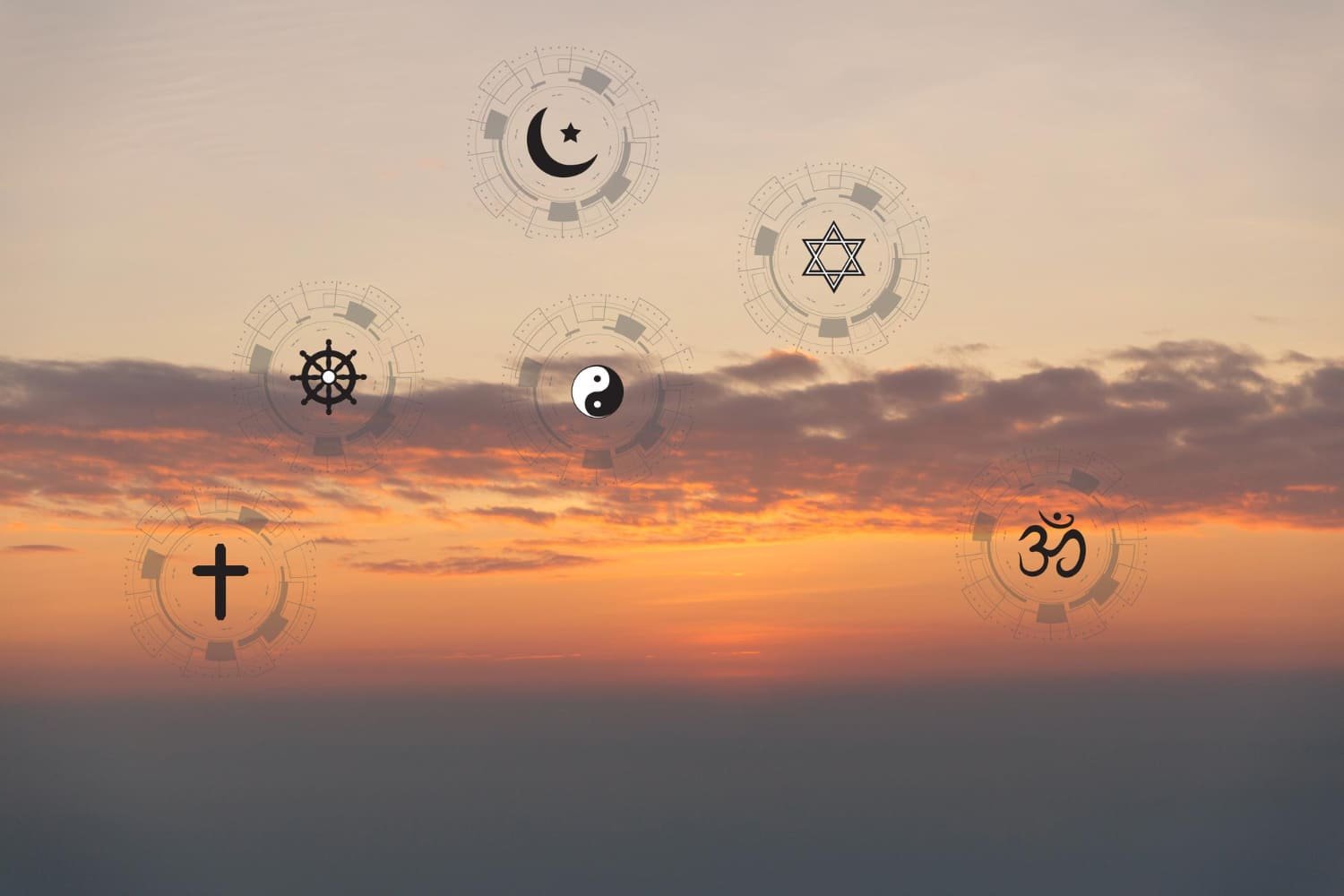When it comes to religion, two of the most prominent faiths in the world are Judaism and Islam. Both religions have a rich history and a significant following, with millions of people around the world practicing one or the other.
While there are some similarities between the two religions, there are also many differences that set them apart from one another.
One of the most significant differences between Judaism and Islam is their belief in God.
Judaism is a monotheistic religion that believes in one God, who is the creator of the universe and everything in it. Islam, on the other hand, also believes in one God, but they refer to him as Allah. They believe that Allah is the only God and that he is the same God worshipped by Jews and Christians.
Another significant difference between Judaism and Islam is their holy books. Jews follow the Torah, which is the first five books of the Hebrew Bible. Meanwhile, Muslims follow the Quran, which they believe is the word of God as revealed to the Prophet Muhammad.
The Torah is written in Hebrew, while the Quran is written in Arabic, which reflects the differences in language and culture between the two religions.
History and Origins
Judaism is one of the oldest monotheistic religions in the world, dating back to over 3,000 years ago in the Middle East. It originated with the Hebrew people, who believed in one God who revealed himself to Abraham, Moses, and the Hebrew prophets.
The Hebrew Bible, also known as the Tanakh, is the primary religious text of Judaism and contains the history, laws, and teachings of the religion.
Islam, on the other hand, was founded by Prophet Muhammad in the year 622 CE in the Arabian Peninsula. According to Islamic tradition, the angel Gabriel appeared to Muhammad and revealed to him the teachings of Allah, which were recorded in the Quran. The Quran is the primary religious text of Islam and contains the beliefs and practices of the religion.
While both religions share a common origin in the Abrahamic tradition, they have distinct differences in their history and origins. Judaism traces its lineage through Isaac, the son of Abraham, while Islam traces its lineage through Ishmael, the son of Abraham and Hagar.
Additionally, Judaism has a long history of persecution and diaspora, with Jews being expelled from their homeland multiple times throughout history. Islam, on the other hand, spread rapidly throughout the Arabian Peninsula and beyond, with the Islamic empire expanding to include much of the Middle East, North Africa, and parts of Europe and Asia.
Beliefs and Practices
Judaism and Islam are both Abrahamic religions, which means they trace their spiritual lineage back to the prophet Abraham. However, they have many differences in their beliefs and practices. One of the main differences is their view of God.
Jews believe in one God who is personal and can be approached through prayer and study of the Torah. Muslims also believe in one God, but they see Him as transcendent and not personal, and they approach Him through daily prayers and recitation of the Quran.
Another difference is their view of prophets. Jews believe in many prophets, including Abraham, Moses, and David, and they see them as human beings who were chosen by God to deliver His message to the people.
Muslims also believe in many prophets, including Abraham, Moses, and Jesus, but they see Muhammad as the final prophet who received the complete and final revelation from God through the Quran. Judaism and Islam also have different practices and rituals.
Jews observe the Sabbath on Saturday and follow a strict dietary code called Kashrut, which forbids the consumption of certain foods such as pork and shellfish. Muslims observe Friday as their holy day and follow a dietary code called Halal, which forbids the consumption of pork and alcohol.
In terms of prayer, Jews pray three times a day and wear prayer shawls and phylacteries during their prayers. Muslims pray five times a day and face Mecca during their prayers.
Overall, while there are many similarities between Judaism and Islam, there are also significant differences in their beliefs and practices. It is up to each individual to decide which religion resonates with them more.
Comparison of Beliefs and Practices
Judaism and Islam are both monotheistic religions, believing in one God. However, the two religions have different beliefs and practices.
For example, Jews believe that God chose them as his people and gave them the Torah, which contains the Ten Commandments and other laws. Muslims believe that God chose Muhammad as his prophet and revealed the Quran to him.
One of the biggest differences between Judaism and Islam is their approach to prayer. Jews pray three times a day, while Muslims pray five times a day. Jews pray facing Jerusalem, while Muslims pray facing Mecca. In addition, Muslims perform ablutions before prayer, which involves washing their hands, face, and feet. Jews do not perform ablutions before prayer.
Another difference between the two religions is their approach to dietary laws. Jews follow kosher dietary laws, which prohibit the consumption of certain animals, such as pigs, and require the separation of meat and dairy products.
Muslims follow halal dietary laws, which also prohibit the consumption of certain animals, such as pigs, and require the meat to be slaughtered in a specific way.
Both religions also have different holidays and celebrations. For example, Jews celebrate Passover, Hanukkah, and Yom Kippur, while Muslims celebrate Eid al-Fitr and Eid al-Adha. Passover commemorates the Jews’ liberation from slavery in Egypt, while Eid al-Fitr celebrates the end of Ramadan, the month of fasting in Islam.
Overall, while there are similarities between Judaism and Islam, there are also many differences in their beliefs and practices. It is up to the individual to decide which religion they believe is better suited for them.
Similarities and Differences in Worship
Islam and Judaism are both monotheistic religions that worship one God. Muslims believe in Allah and Jews believe in Yahweh. Both religions also have a strong emphasis on prayer and worship, with daily prayers being an important part of their respective faiths.
However, there are also significant differences in the way that Islam and Judaism approach worship. For example, Muslims pray five times a day, while Jews pray three times a day. Muslims also face Mecca during prayer, while Jews face Jerusalem.
Additionally, Muslims perform ablutions before prayer, while Jews do not have any specific ritual washing before prayer.
Another key difference is the use of religious icons and images. While Islam prohibits the use of any images or representations of God or the Prophets, Judaism allows for the use of religious symbols and images, such as the Star of David and the menorah.
When it comes to the role of women in worship, there are also some differences between Islam and Judaism. In Islam, men and women are separated during prayer, with women praying behind men. In Judaism, men and women can pray together, but Orthodox Judaism still maintains gender separation in synagogues.
Overall, while there are some similarities in the worship practices of Islam and Judaism, there are also significant differences in the rituals and beliefs of the two religions. Understanding these similarities and differences can help foster greater understanding and respect between followers of both faiths.
Comparison of Holy Scriptures
One of the primary differences between Judaism and Islam is their holy scriptures. Judaism’s holy scripture is the Tanakh, also known as the Hebrew Bible, which is composed of three parts: the Torah, the Nevi’im, and the Ketuvim.
The Torah is the most important part of the Tanakh and contains the first five books of the Bible, which are also known as the Pentateuch. The Torah contains the laws and commandments that Jews are required to follow.
On the other hand, Islam’s holy scripture is the Quran, which is believed to be the word of God as revealed to the Prophet Muhammad. The Quran contains 114 surahs, or chapters, which are divided into verses. Muslims believe that the Quran contains the complete and final revelation of God’s message to humanity.
While both religions have their own holy scriptures, there are some similarities between the two. For example, both Judaism and Islam recognize the importance of prophets and believe that God has communicated with humanity through them.
Additionally, both religions believe in the concept of monotheism, which is the belief in one God.
However, there are also some significant differences between the two holy scriptures. For example, the Tanakh contains the history of the Jewish people and their relationship with God, while the Quran focuses primarily on the relationship between God and humanity.
Additionally, while the Torah contains the laws and commandments that Jews are required to follow, the Quran contains both ethical and legal teachings.
Another major difference is the language in which the holy scriptures are written. The Tanakh is written in Hebrew, while the Quran is written in Arabic. This has led to differences in interpretation and understanding of the texts.
Overall, the differences between the holy scriptures of Judaism and Islam reflect the different beliefs and practices of the two religions. While there are some similarities, there are also significant differences that reflect the unique history, culture, and beliefs of each religion.
Comparison of Religious Holidays
Judaism and Islam are two of the world’s most well-known religions, and they have a lot in common, including a shared history and many similarities in their beliefs and practices. However, there are also many differences between the two religions, including their religious holidays.
One of the most significant differences between Judaism and Islam is the way they celebrate holidays. Jewish holidays are based on the lunar calendar, while Islamic holidays are based on the lunar Islamic calendar. This means that the dates of Jewish holidays change every year, while Islamic holidays remain on the same day in the Islamic calendar.
One of the most important Jewish holidays is Yom Kippur, which is known as the Day of Atonement. It is a day of fasting, prayer, and repentance, and it is considered the holiest day of the Jewish year. Muslims also have a day of fasting, which is called Ramadan. During Ramadan, Muslims fast from dawn until sunset for a month.
Another significant Jewish holiday is Passover, which celebrates the liberation of the Jewish people from slavery in Egypt. It is a week-long holiday that involves many rituals and traditions, including the Seder meal. Muslims have a similar holiday called Eid al-Fitr, which marks the end of Ramadan and is celebrated with feasting and gift-giving.
One of the most important Islamic holidays is Eid al-Adha, which is also known as the Feast of Sacrifice. It commemorates the willingness of Ibrahim (Abraham) to sacrifice his son as an act of obedience to God, and it involves the sacrifice of an animal, which is then distributed to the poor. Jews also have a holiday that involves the sacrifice of an animal, which is called Yom Kippur.
Overall, while there are many similarities between the religious holidays of Judaism and Islam, there are also many differences. Both religions have holidays that involve fasting, sacrifice, and feasting, but the specific rituals and traditions associated with each holiday are unique to each religion.
Comparison of Religious Leadership
Both Judaism and Islam have a hierarchical religious leadership structure. In Judaism, the religious leaders are known as rabbis, while in Islam, they are known as imams.
In Judaism, the rabbis are responsible for interpreting and teaching Jewish law, as well as providing guidance and counseling to members of the community. They are also responsible for leading religious services and performing certain rituals, such as circumcisions and weddings.
In Islam, the imams serve as leaders of the mosque and are responsible for leading prayers, giving sermons, and providing guidance to members of the community. They are also responsible for interpreting Islamic law and providing religious education.
One key difference between the two religious leadership structures is that in Islam, the imam is often seen as a political as well as a religious leader, particularly in countries where Islam is the dominant religion. In contrast, the role of the rabbi is primarily religious and does not typically involve political leadership.
Another difference is that in Judaism, the position of rabbi is not reserved exclusively for men, while in Islam, the position of imam is typically held by men. However, there are some Islamic communities that have female imams.
Overall, both Judaism and Islam place a strong emphasis on religious leadership and the importance of having knowledgeable and respected leaders to guide the community.
Conclusion
While there are certainly similarities between Judaism and Islam, such as their shared belief in one God and their reverence for Abraham, they are also fundamentally different in many ways.
Judaism places a strong emphasis on the importance of following the Torah and the Talmud, while Islam emphasizes the importance of following the Quran and the Hadith.
Additionally, Judaism places a strong emphasis on the concept of chosenness and the covenant between God and the Jewish people, while Islam emphasizes the importance of submission to God’s will.
Ultimately, it is up to each individual to decide which religion, if any, is right for them. Some may be drawn to the rich history and traditions of Judaism, while others may be drawn to the simplicity and clarity of Islam. Still others may find that neither religion speaks to them, and may choose to explore other spiritual paths.
Regardless of which path one chooses, it is important to approach religion with an open mind and a willingness to learn.
By seeking out knowledge and understanding, one can gain a deeper appreciation for the diversity and complexity of the world’s many religions, and can find greater meaning and purpose in their own spiritual journey.







